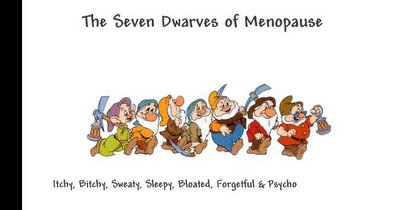In Praise of Age
 Even Benjamin Franklin says older women make the best lovers, although he did qualify it with "...because they're so grateful." Bastard. What did he know? The man had 11 illigitimate children, not with the same woman. He wasn't around long enough to witness menopause.
Even Benjamin Franklin says older women make the best lovers, although he did qualify it with "...because they're so grateful." Bastard. What did he know? The man had 11 illigitimate children, not with the same woman. He wasn't around long enough to witness menopause.There's been an influx of older women heroines during the past couple of years, and I for one am grateful as hell. About damn time. More women in their 40's and 50's and 60's discovering they can write these characters, too. I was pleasantly surprised to find a contingent of my contemporaries in Reno this summer who were geriatric go-getters, women who could pen passion like nobody's business, traipse up and down stairs for the seminars, call the kids and grandkids during breaks, then whip out the sequins and shine among the stars at night.
One of my 'older' friends still writes virgin heroines for Silhouette, and I've been tempted to ask her if she's stuck in that era for personal or financial reasons. I'm sure heroines with hymens sell well - this gal has been selling that product longer than I've been writing. She thinks that writing "those words" the way I do for my erotic fiction would get tiresome--I feel the same way about a character in awe of a penis.
Give me an older man, too, one with some common sense, the muscles to pick up his own shorts and socks, and the ability to see past the superficial into the sublime. So what if he doesn't have a 28" or 32" waist and he has more hair under his pits than on top of his head? My question is can he cook? Does he know how to assuage a child's fears, buy tampons when his wife or daughter can't leave the heating pad or the bathroom, or distinguish the difference between "I just want you to hold me" and "Let's get it on."
What do these have to do with writing, you might ask? Everything. When you create a character, you have to do more than just assign them a hair color and an age. This is where 'write who you know (you'll hear me preach that one a lot) as opposed to 'write what you know' comes into play. Doesn't matter if you're writing children's stories, science fiction, myseries, or romance--know your characters, and for Pete's sake learn how to layer.
I recently read a friend's manuscript - cute idea, delightful description, awesome setting. Terribly one-dimensional characters. It was as if she was writing what she thought she should rather than what she actually knew. To her, this is her best work. To me, it's a wall-banger. Where's the beef? And I'm not referring to his throbbing member or her moist Hills Like White Elephants. I'm talking about character, depth, emotion, passion, life force. What drives those characters?
What drives yours? Is it their inability to communicate, their exuberance with human contact, their reluctance to share material possessions...or themselves? If you could assign one simple, not complex, sentence to describe them, what would it be? If it's a physical description, give yourself a point. If it's something depicting their thought processes, add a point. If you can pit them against their universe that you've created, go to the head of the class. What makes a character interesting isn't how they look or even how they think (although that's the better of the two)--it's how they use their attributes to interact with others and their universe.
Age your characters--not physically, not with description, but with character, depth, finesse. If you must concoct a virgin (hey, nothing wrong with that), at least show them to be more than the sum of their anatomy. Give them a reason, if you write romance, to sleep with someone other than the fact that they are physically attracted. Otherwise, all you have is another f*** book, whether you illustrate the act graphically or subtly. That is what gives romance a bad name. Make the book more about the relationship, the interconnection, the shared and disproportionate likes and dislikes. Don't overshadow the relationship by adding angst, humor, terror, a mystery--ENHANCE the relationship. Those are merely elements to contribute to the overall romance, not to detract. Quite often, even good writers toss in so many extraneous, external conflicts that they lose sight of the primary goal of a romance...the relationship. If you write suspense, have at it. Ditto for fantasy or whatever subgenre. But if the cover or spine of that book will have the word "romance" attached to it, please develop the relationship and internal conflict as much if not more than you do the external.
See Wendy the Librarian's reviews of romances she's reviewed in November - she explains it better than I do at times.
Don't be afraid to "age" your characters, no matter their numerical value. Layer them so that they pop off of the page. View them as more than their physical characteristics. Even children sometimes possess old souls, and adults often never grow out of childhood. If you don't believe me, read the passages in Harper Lee's To Kill A Mockingbird on Boo Radley.
And that's all I'm gonna say about that for today. Happy Writing, Everyone.




2 Comments:
My ex is still stuck at about 16 *ggg* as usual, great post doll!
"Age your characters--not physically, not with description, but with character, depth, finesse."
I couldn't agree more. It's called layers. And make them oh so hard to peel. LOL!
Tanya
Post a Comment
<< Home